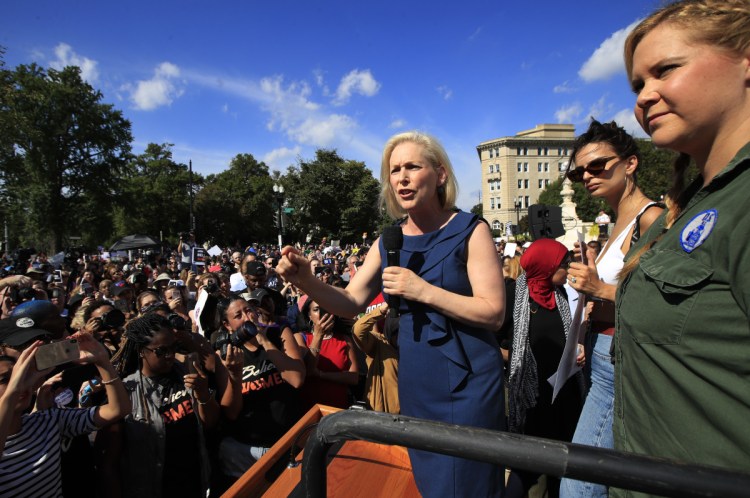WASHINGTON — Democrats and representatives for those who claimed to have been victimized by Brett Kavanaugh angrily denounced the FBI’s background check of Kavanaugh on Thursday, asserting that the bureau, shackled by the White House, did not pursue obvious leads that could have helped corroborate the allegations the Supreme Court nominee faced.
The FBI interviewed nine people in its weeklong look at Kavanaugh, and the White House and Republicans seized on its findings to declare that the claims of sexual misconduct remained uncorroborated. Sen. Susan Collins, R-Maine, considered a critical swing vote on Kavanaugh’s nomination, said the probe seemed to be “a very thorough investigation.”
Democrats, though, disputed those characterizations, asserting that what was more important than what the bureau did not find was what its agents did not pursue.
Sen. Robert Menendez, D-N.J., who has been repeatedly investigated by the FBI, called the bureau’s work on the Kavanaugh matter “a bulls— investigation. The reality is that is not a full and thorough investigation. … You don’t get corroboration if you don’t talk to corroborating witnesses.”
Lawyers for two of Kavanaugh’s accusers said the FBI did not interview dozens of people whose information they provided and who would have supported their clients’ accounts.
“The ‘investigation’ conducted over the past five days is a stain on the process, on the FBI and on our American ideal of justice,” lawyers for Christine Blasey Ford, who claims Kavanaugh sexually assaulted her when both were in high school, wrote in a letter to FBI Director Christopher Wray.
An FBI spokeswoman declined to comment.
The FBI has spent most of the past two years at the center of a partisan maelstrom as it investigated Hillary Clinton’s use of a private email server and then President Trump’s election campaign.
Officials knew that when they were drawn into the Kavanaugh matter, their work was destined to become mired in politics and leave many feeling unsatisfied.
Because agents were tasked with performing a background check rather than a criminal investigation, the scope of their work was decided by the White House, which seemed to be taking significant direction from Senate Republicans. The FBI never planned to draw any conclusions about the credibility of the allegations or Kavanaugh’s worthiness as a judge – which are questions left for the White House and Senate.
Initially, the FBI was asked to interview four witnesses. Three – Mark Judge, Peter Smyth and Leland Keyser – were at the gathering where Ford said Kavanaugh pushed her onto a bed and groped at her.
The fourth, Deborah Ramirez, had separately alleged that Kavanaugh exposed his penis to her when both were students at Yale.
The limited breadth, though, sparked significant controversy, and the White House soon permitted the FBI to expand its investigation – albeit only modestly. The White House, for example, barred a broad look at Kavanaugh’s youthful drinking and whether he had misled the Senate in testifying about it, people familiar with the process said. Some Republican senators insisted Thursday that the FBI was allowed to interview those the agency deemed appropriate.
“The FBI has gotten all the permission they need in order to interview whoever they think is necessary,” Sen. John Cornyn, R-Texas, said at a news conference.
Agents also talked to two other men, Tim Gaudette and Chris Garrett, who were listed on a calendar as being with Kavanaugh at a gathering at a house on July 1, 1982.
The calendar entry had fueled some speculation that the gathering might have been the one at which Ford claimed to have been assaulted, though the list of attendees did not match those she had recalled being in the house when she said the attack took place.
The bureau also interviewed three other people, whose names have not yet been made public, according to the White House. Notably, though, agents did not talk to Ford herself, nor did they interview the more than a dozen other people whose names Ford’s legal team provided to the bureau.
The legal team said those people would have challenged the credibility of Kavanaugh’s Senate testimony or provided other information to support Ford’s account.
If agents had interviewed those people, a member of Ford’s legal team told The Washington Post, they might have learned that Ford was never focused on July 1 as the date that the assault occurred.
Send questions/comments to the editors.



Success. Please wait for the page to reload. If the page does not reload within 5 seconds, please refresh the page.
Enter your email and password to access comments.
Hi, to comment on stories you must . This profile is in addition to your subscription and website login.
Already have a commenting profile? .
Invalid username/password.
Please check your email to confirm and complete your registration.
Only subscribers are eligible to post comments. Please subscribe or login first for digital access. Here’s why.
Use the form below to reset your password. When you've submitted your account email, we will send an email with a reset code.